Lugging water into the desert for thirsty migrants unites this couple. Trump divides them
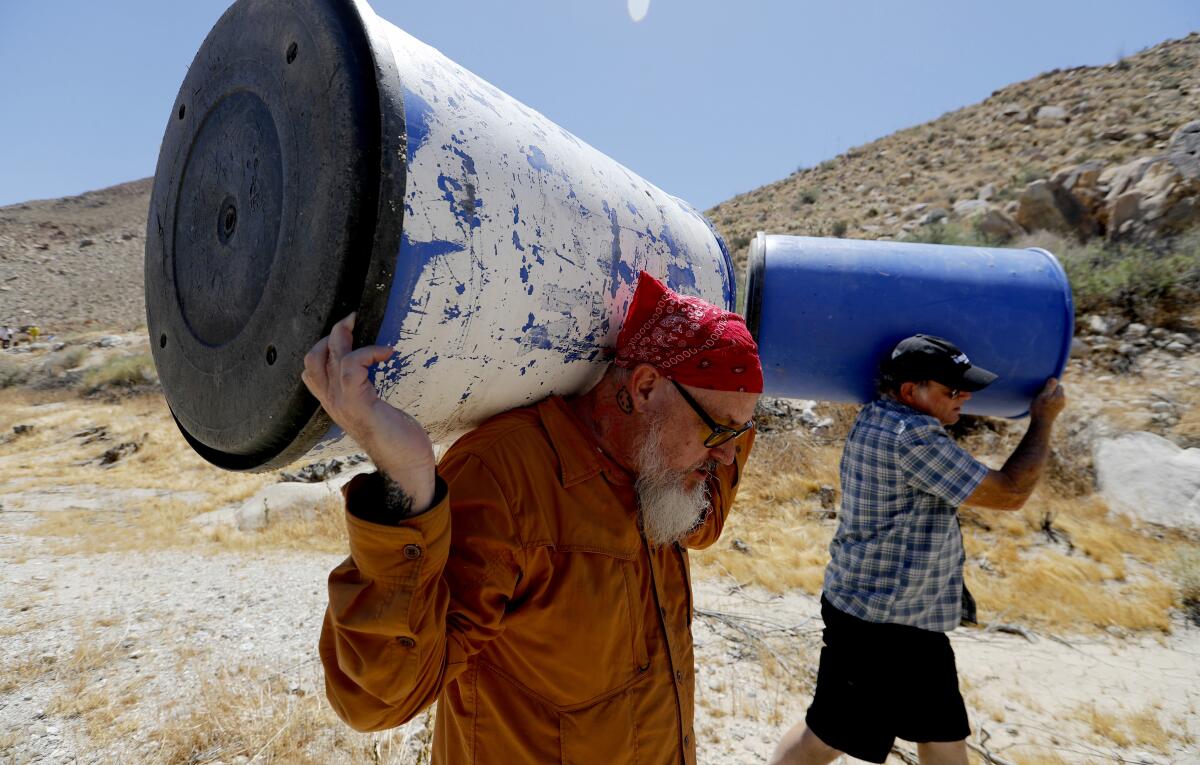
- Share via
OCOTILLO, Calif. — When news about President Trump flickers across their television, Laura and John Hunter know that one of them needs to leave the room.
They’d rather not quarrel about how Trump is handling an issue they both care about deeply: immigration.
John is part of a conservative political dynasty: His older brother, Duncan Lee Hunter, served in Congress from 1981 to 2009 and pushed — successfully — for the “triple fencing” that separates the cities of Tijuana and San Diego. His nephew is Rep. Duncan Duane Hunter (R-Alpine), who succeeded his father and was indicted on corruption charges in August of last year.
John believes in Trump. Laura is a Mexican immigrant who dismisses Trump as a “despicable human being.”
But there’s one mission that continues to bind them.
About once a month, they travel into the desert east of San Diego with a handful of volunteers who are focused on one of the grimmest aspects of U.S. immigration policy — the deaths of those who are trying to cross the border illegally. The volunteers fill and maintain more than 100 water stations scattered along the sun-bleached California borderlands.
The Hunters’ journeys into the desert are one of the main reasons their marriage has survived the dramatic collision of emotions that the 45th American president inspires in each of them. They love each other — but the last 2½ years have tested them.
“We both have strong feelings for each other, but also I have a strong character and he does too,” Laura said. “This situation with Trump hasn’t helped.”
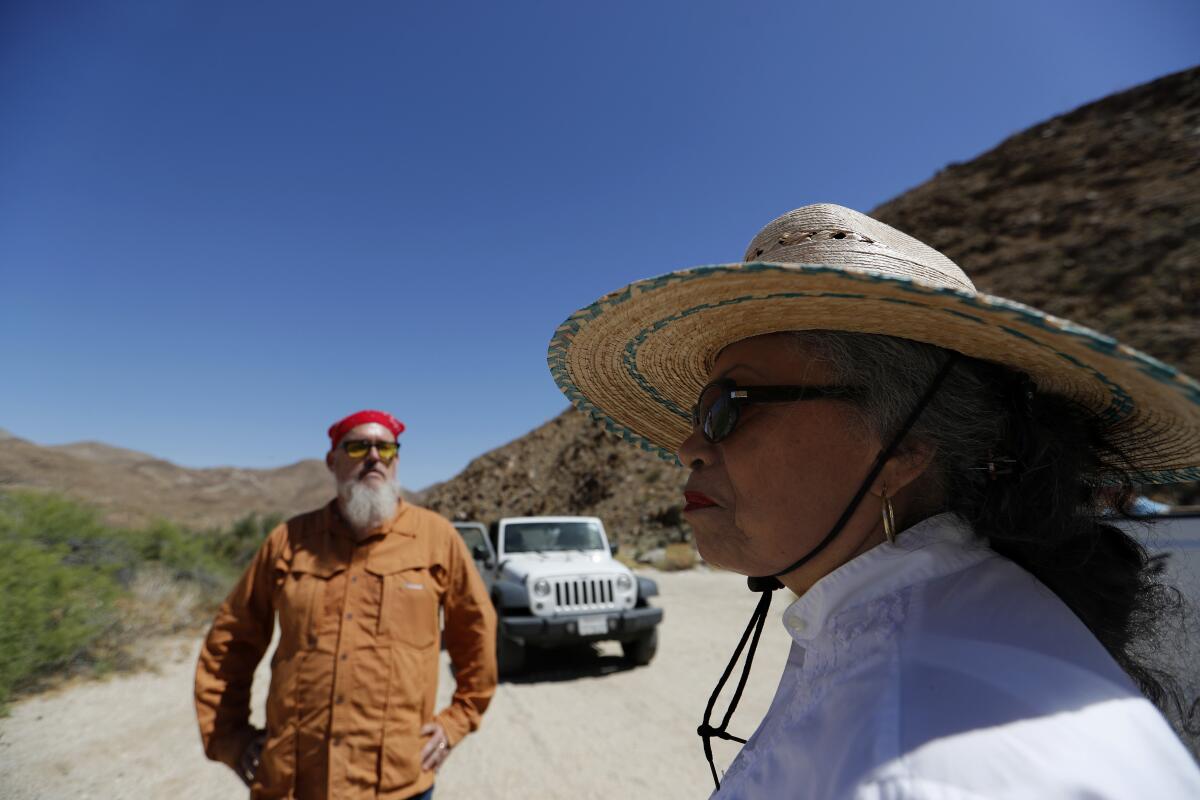
John said he doesn’t see a conflict between his desire to save the lives of people who are trying to cross the border illegally and his support for a president who has described the same people as rapists, criminals and gang members. “People were dying during the Clinton era, in the Bush era, in the Barack era,” he said. “They are still dying in the Trump era.”
And they still desperately need water.
The couple met 19 years ago in the low desert of Imperial County, shortly after John had launched his ambitious Water Station project. He was, he said, apolitical on the topic of illegal immigration.
The barrier promoted by his brother had resulted in a decrease in illegal immigration in the San Ysidro area of San Diego, but immigrants who were desperately trying to cross the border were pushed to the east, into unforgiving desert terrain. Thousands of them have died in eastern California and Arizona in the last 25 years.
Laura had read about the venture in a local newspaper and signed on as a volunteer. Their political differences were immediately apparent, but they both opposed abortion, and the water stations, with their potential to save lives, seemed to be an extension of that belief. After a couple of years, their friendship became something more; they started dating and eventually married.
John, 63, who is lanky and wears muted, buttoned-down shirts, has a voice with just a hint of Jimmy Stewart’s Midwestern accent. Laura, 72, favors bright clothing, red lipstick and proudly embraces the plume of silver-and-black wavy hair that frames her chiseled face.
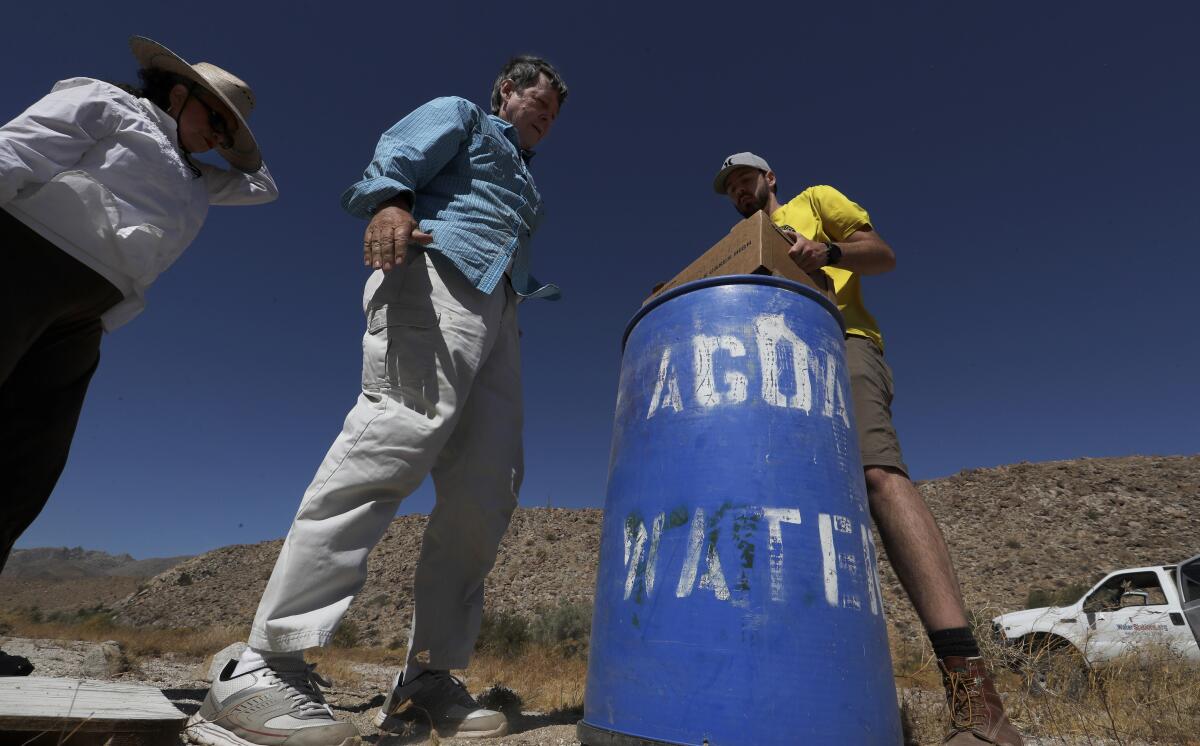
He’s a toy inventor who earned a doctorate in particle physics and worked on satellite technology at Lawrence Livermore National Laboratory. She’s a retired elementary school teacher who raised three girls — mostly on her own — along the border regions of San Diego and Mexicali, Mexico. Their Escondido home is notable for its bright walls and Oaxacan pottery and paintings. Some rooms could be easily confused for a Mexican art museum.
They’ve been a couple for many years, with established routines. Sometimes he cooks crepes for her on the weekend. She serves him iced tea on hot days. Their children — from different marriages — are grown, and they dote on Fifi, their Maltese poodle.
In their own way, the Hunters reflect the diversity of the Water Station group, which consists of about 10 core volunteers who come together twice a month in Ocotillo, a tiny community in Imperial County. A few are apolitical. At least four — including John Hunter — lean to the right. The rest — mostly the younger ones — are left-leaning activists.
“On this one topic — saving lives in the desert — you could say we are all liberals,” John said. “I just consider it being normal. When temps hit 115, people focus on the basics of survival, and petty differences are ignored.”
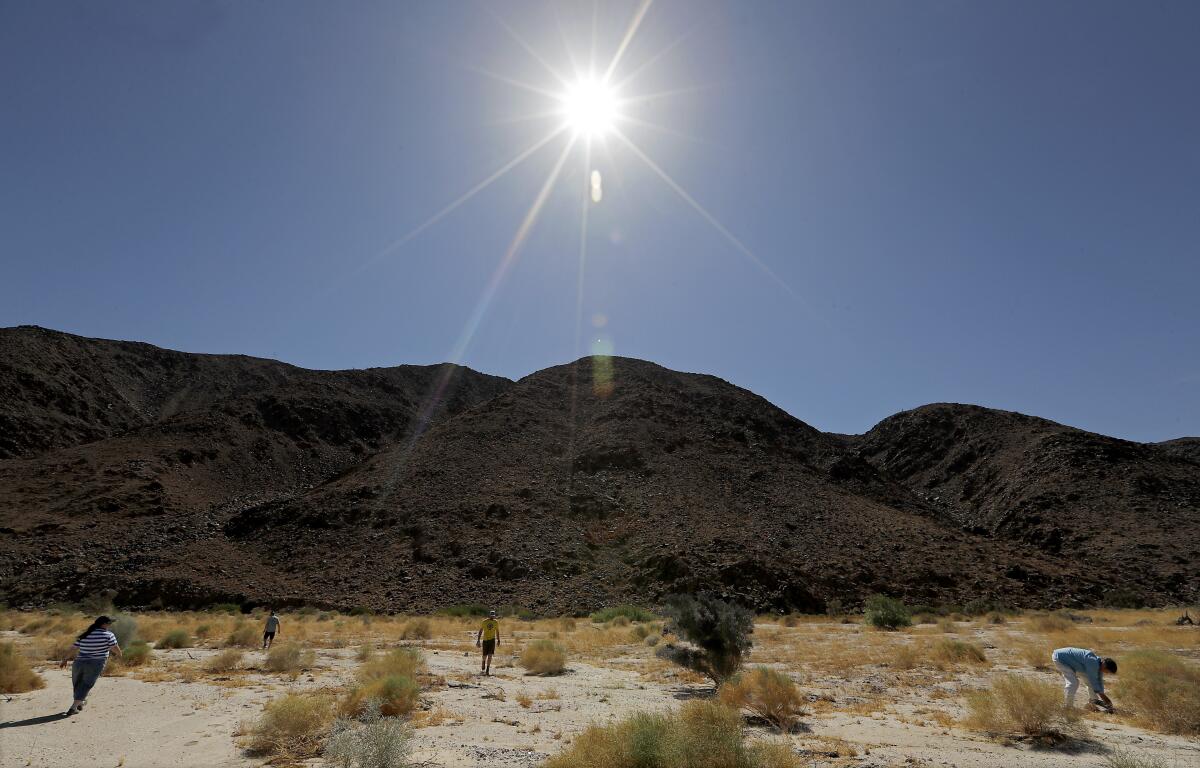
From the start, Duncan Hunter, 71, supported his brother’s water project and even helped him obtain permits to set up stations on land operated by the Bureau of Land Management. There is no contradiction, he says, between his support for his brother’s mission to save immigrant lives and his desire for tough border enforcement.
“The fact that you don’t have a secure border leads to people coming to the border and dying of dehydration or exposure in the desert,” the former congressman said. “If you had 200 high school kids a year drowning in a canal, what would you do? You’d fence off the canal.... You keep people from dying.”
::
Early on a June morning, Rob Fryer, a retired chicken farmer and computer engineer who lives in Solana Beach, arrived at Laura and John’s home to prepare for another trek into the desert. Piling into the Hunters’ truck, they drove east to meet with about a dozen volunteers at the Red Feather Cafe in Ocotillo. Fifi came along for the ride.
When John first launched his project, migrant deaths were on the rise, hitting a peak of 96 in the El Centro Sector — a 70-mile stretch of border in the Imperial Valley — in fiscal year 2001, according to Border Patrol data. For a time, fatalities declined in the area, but last year, 17 people trying to cross illegally died, and that had the Hunters worried.
They had hoped to retire by now, leaving the work in the hands of a younger generation. But as much as they’ve tried to break away, the work pulls them back. There just aren’t enough volunteers.
John doesn’t agree with Trump about the need for more border fencing. But he’s happy that the president is tackling illegal immigration. “Everyone else before him has just passed the buck,” he said. “He’s forcing people to address the issue. Everyone loses when you don’t talk about it.”
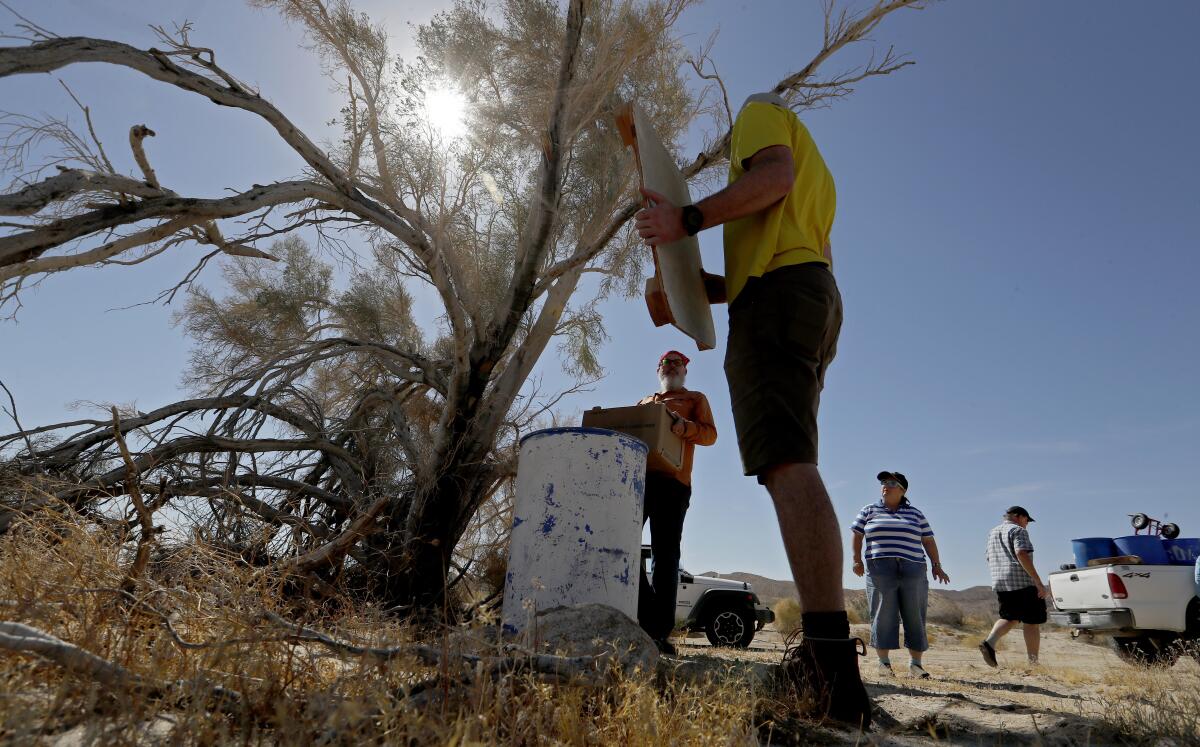
When pressed about the Trump administration’s immigration policies and practices, such as the squalid conditions at detention facilities along the U.S.-Mexico border or the dismantling of the asylum system, John says he doesn’t know much about the issues.
But he adds that he believes the media are biased against Trump, citing coverage of the mass shootings at an El Paso Walmart in August. And he credits the president for the strong economy.
Column One
Column One
Column One is a showcase for compelling storytelling from Los Angeles Times.
“There has been so much Trump hatred,” John said. “All of what the left has done has actually driven me the other way.”
Laura sees Trump as uncouth and chauvinistic, and she blames his rhetoric for the deaths in El Paso.
“I don’t like Trump, and it’s not because of the media. It’s what comes out of his mouth — all the insults and ignorance,” she said. “I want someone to be presidential with a level head.”
Then she paused and took a deep breath.
“This Trump stuff has been negative on our marriage, big time,” she said.
‘There has been so much Trump hatred. All of what the left has done has actually driven me the other way.’
— John Hunter
::
After a short meeting at the cafe in Ocotillo, the group broke off into two teams. The Hunters were joined by Fryer and John’s 30-year-old son, Johnny.
As John navigated the remote and rocky terrain in Anza-Borrego Desert State Park, large blue and white barrels and 12 gallons of water started to bounce up and down in the back of the truck.
Morning temperatures had already reached 90 degrees, relatively pleasant for a place where they can rise to 125. The truck traversed a hard-scrabbled dirt road, past a sign that read: “FOOT TRAVEL ONLY, NO VEHICLES.”
Twelve years ago the group struck an agreement with the park, which allows them to place water stations in 14 separate locations. While the water is mostly intended for people clandestinely crossing the U.S.-Mexico border, it has been consumed by others, John said, evidenced by thank-you notes left by grateful hikers, off-road enthusiasts and other non-migrants who have found themselves in a bind.
Vandalism is common. Sometimes people shoot at the barrels or dump the water. In Arizona, there have been instances of Border Patrol agents emptying or kicking bottles of water intended for people crossing the border. A humanitarian worker’s hidden camera captured video from 2010, 2012 and 2017 of agents in the act of puncturing or kicking water bottles.
Every mile, the Water Station volunteers checked on the boxes of water stored in blue barrels with wooden lids, placing rocks on top to keep the forceful winds from blowing the lids away.
‘I don’t like Trump, and it’s not because of the media. It’s what comes out of his mouth — all the insults and ignorance. I want someone to be presidential with a level head.’
— Laura Hunter
The volunteers didn’t talk much, as they wiped sweat from their brows and gulped cold water. At the end of the trail, they parked their vehicles and walked about half a mile to establish two new stations.
Fryer and Brett Stalbaum each carried a barrel. Paula Poole carried a shovel. John and his son hauled out a dolly stacked with four boxes full of gallon jugs of water. Laura carried Fifi.
In the late morning, they started the drive toward home and John talked about his next project: trying to raise money to place cell towers in an area near the Arizona border that currently doesn’t have service. Immigrant deaths there have escalated as the California border has been fortified.
Laura thinks it’s a good idea.
“I think the situation in the desert or the mountains … is not about immigration. It’s about life or death and we try to help a little bit,” she said. “Whatever we can do to stop people from dying.”
::
Sometimes the civility that defines their volunteer work in the desert dissipates when the Hunters are back at the house.
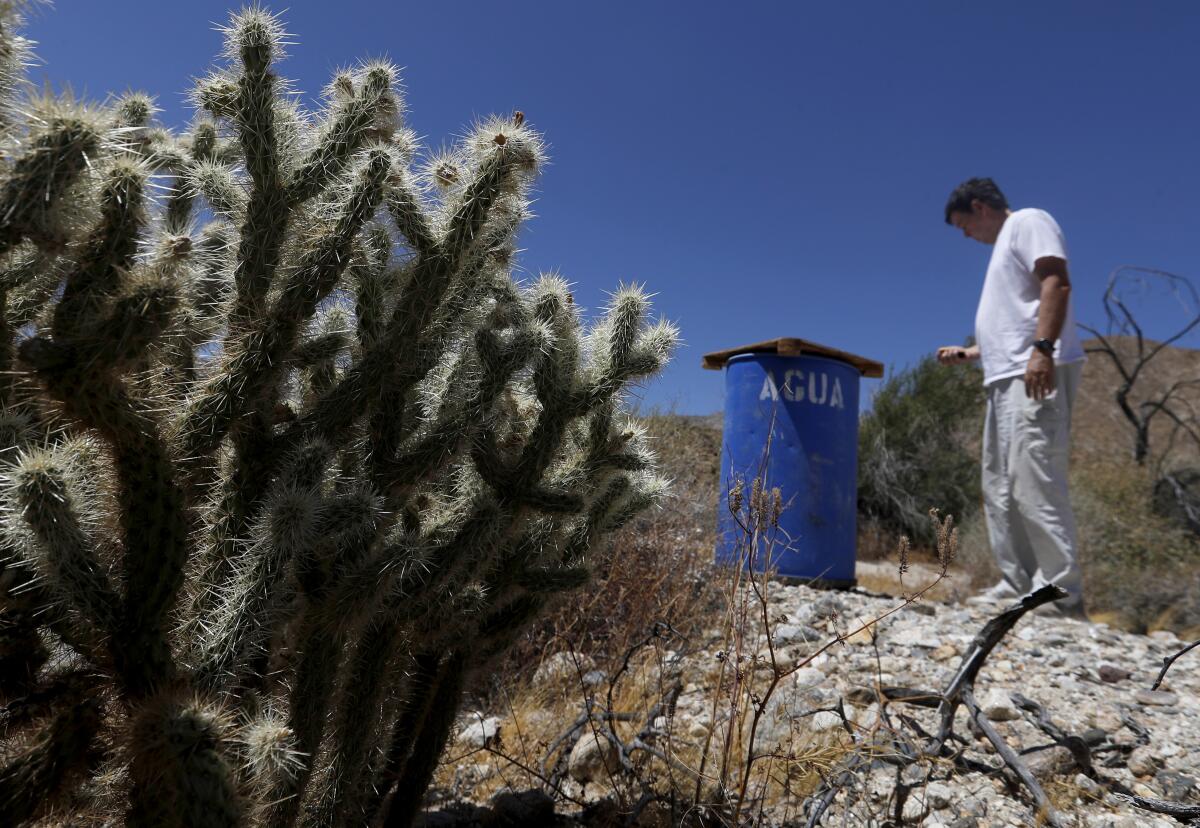
During one particularly heated moment, the couple talked over each other, and Laura Hunter said, sarcastically, “Now you are sounding like Trump, sweetheart.”
“She doesn’t like my candidate,” John said.
Laura responded with a quip: “Are you going to vote for someone who insulted Mexicans? You have a Mexican wife, John.”
Her husband made it a point to remind her that he didn’t vote for Trump in 2016 “because he didn’t want to vote for someone who said bad things about my wife.”
But this time around, he said, he plans to vote for Trump.
Laura has other plans. “You know what?” she said. “I’m going to block his vote.”
John laughed.
“He is opinionated and so am I,” Laura said. “I’m not an extension of him.… We have to agree to disagree. We have to agree to get along.”
And for the most part they do. Nearly every Friday, they go out to dinner — it’s usually Mexican food — before heading to downtown Escondido, where they watch pre-1970s vintage cars slowly cruise up and down Grand Avenue. John fawns over Laura, calling her “my dove” and opens the door for her wherever they go. Laura is affectionate, caressing John’s hand during long drives.
They anticipate their next trip to the desert, carting jugs of water with the goal of saving lives, just as they have for the last 19 years.
But days after the El Paso shooting, after 22 people were killed, they still hadn’t discussed it.
More to Read
Sign up for Essential California
The most important California stories and recommendations in your inbox every morning.
You may occasionally receive promotional content from the Los Angeles Times.









